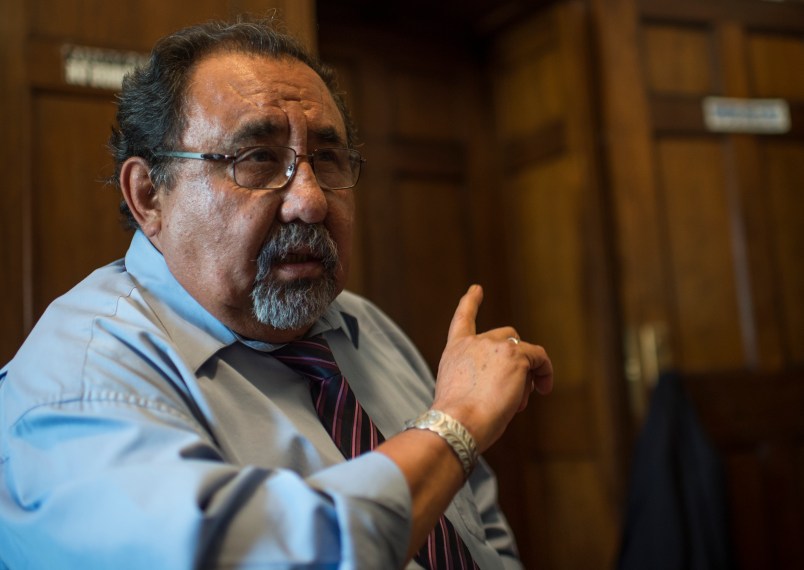Members of Congress on both sides of the aisle are pushing back forcefully against the Trump administration’s new position on whether Native Americans can be forced to comply with Medicaid work requirements, telling TPM that allowing individual states to make that call is a “disaster” with serious “constitutional problems.”
The Trump administration’s lead Medicaid official Seema Verma said Monday in a speech to the American Hospital Association that HHS is dropping its previous claim that giving tribal members any kind of exemption from Medicaid work requirements “could raise civil rights issues,” because it would be an illegal racial preference.
“We believe we can give states flexibility and discretion to implement the community engagement requirements with respect to local tribal members,” Verma said. “We look forward to working with states and tribes to try to help them achieve their goals and determine how to best apply community engagement to serve their populations.”
But Republican and Democratic lawmakers say this new stance is just as bad, if not worse, than the administration’s original position.
“They’ve turned the decision over to the states to do this administration’s dirty work, but the fundamental problem applies to the states as well,” Rep. Raúl Grijalva (D-AZ) told TPM. “The relationship with tribes is a government-to-government relationship, because these are sovereign nations. As such, the state has no right or legal precedent to interfere in that relationship. I don’t think it’s appropriate at all.”
Grijalva, who represents several Native American tribes in Southern Arizona and is a leader of Congress’ Native American Caucus, said HHS should instead make clear that all Native Americans are entitled to “a full exemption,” and that any other outcome would trigger “constitutional problems.”
Rep. Tom Cole (R-OK), himself a member of the Chickasaw Nation, agreed, predicting to TPM that the Trump administration and any states who try to force tribal compliance are “going to end up getting a lot of litigation on this and a lot of blowback from both sides of the aisle.”
Cole said that he supports the concept of work requirements for Medicaid generally, he is firmly against “states telling tribes what to do.”
“I disagree violently with that. It would be a disaster,” he said. “No tribal government and no ally of Indian Country could ever support that.”
Over the past few weeks, dozens of House and Senate members, Republicans and Democrats, have written to HHS to rebuke them for asserting that they are legally prohibited from exempting American Indians from the Medicaid work requirements.
Sen. Tom Udall (D-NM), the top Democrat on the Senate’s Indian Affairs Committee who spearheaded the Senate missive, said the changes announced this week are not good enough.
“The administration is still refusing to recognize the federal trust responsibility towards tribes and their members by leaving the fate of the trust responsibility in the hands of state governments — which is also unacceptable,” he said in a statement to TPM. “I continue to take the position that HHS does not have the authority to allow states to impose restrictive conditions, like work requirements, on Medicaid eligibility for tribal members. Such restrictions fly in the face of a foundation of Indian law and longstanding congressional intent, and could endanger lives in Native communities across Indian Country by limiting access to care.”
As of this week, the Trump administration has given four states permission to impose work requirements on their Medicaid beneficiaries, with nearly a dozen more waiting for their waivers to be approved. Under these so-called “community engagement” rules, low-income residents who cannot prove they are working or volunteering a certain number of hours per week will lose their health insurance.
With the unemployment rate much higher for American Indians than any other demographic, compounded with severe health needs in tribal communities, high rates of addiction, and a severely underfunded Indian Health Service, members of Congress say restricting access to Medicaid for Native Americans could be devastating as well as illegal.
Lawmakers also told TPM they fear that the administration could be testing the waters with an eye toward subjecting Native Americans to other state and federal rules.
“This time it is health care, but next time it could be gaming on reservation land, the extraction of natural resources, or anything else,” Grijalva said. “The fundamental question is, does this set a precedent of giving states a significant role over federal Indian law? And if so, aren’t we violating our own trust responsibility?”
Until the administration fully understands the legal rights of Native Americans, Cole says he’ll keep fighting.
“They’re profoundly misinformed when they describe tribes as essentially a racial group. They’re not. They’re sovereign entities that in some cases pre-date the creation of the United States,” he said. “If they pursue this, they’ll be taking on a fight in the courts, in all likelihood, which I think the tribes are in a position to win.”







‘When I use a word,’ Humpty Dumpty said, in rather a scornful tone, ‘it means just what I choose it to mean — neither more nor less.’
They are profoundly misinformed in so many areas of governance, and they are both outraged and bewildered when they find out that the world is not as they assume it to be.
How hum…Congress angry…same s hit different day, these spineless, toothless dopes will indulge the fuck ups in the white house until the cows come home…it is their current role…wallpaper.
Well, all of this administration’s international negotiations with any sovereign nation have basically shown that we, as a nation, are not currently committed to any agreement we have previously committed to.
This unfortunately bodes extremely poorly for the immediate future of tribal agreements and treaties.
What is it that these Marxists and RINOs fail to understand and accept about Manifest Destiny?
This land is MY land
This land is MY land
From California
to the NY Islands
From the Redwood Forests
to the Gulf Stream Waaaaater
This land was made for only whitey…